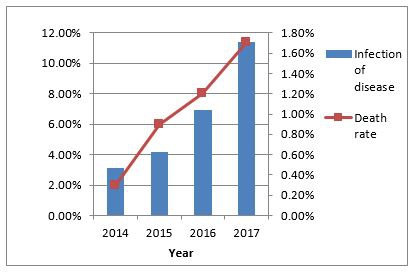Typhoid Fever has been one of the infections that the Ministry of Health in collaboration with the government are fighting hard to if not eradicate permanently perhaps reduce its impact it is having on us as a country.
The Ministry of Health and the government have been working assiduously to educate the general public on this deadly infection that is sending many children and even grownups into their graves, yet it is still a challenge we are struggling with as a country.
A research conducted by the Disease Control in 2015 showed that about 9.5% of the Ghanaian population are affected by Typhoid Fever.
In 2016, another research conducted by this same group indicated that the outbreak of Typhoid Fever in the overcrowded cities such as Accra, Kumasi, Takoradi and the urban areas is as a result of filth and the rural areas that do not have pipe borne water and boreholes but rely on the streams and river water has increased from 9.5% to 13.6%. Out of this about 0.9% do not make it to enjoy life.
Typhoid Fever also known as Enteric Fever is a potentially fatal multisystem illness caused by salmonella serotype Salmonella typhi. This highly adapted human specific pathogen has evolved remarkable mechanisms for persistence in its host that help to ensure its survival and transmission.
Typhoid fever is a major cause of illness and death in overcrowded and unsanitary urban conditions of Ghana and even Africa as a whole. To be more specific, Typhoid Fever is caused by contaminated food and water.
A recent research conducted across the country by the Kintampo Health College (Disease Control Students) late in 2017 indicated that about 5million people were infected with Typhoid Fever of which about 60 thousand deaths were recorded.
This happened as a result of so many reasons such as:
Disposal of refuse into rivers and gutters
Defecation around river banks and running waters
Failure to wash hands with soap
Leaving food uncovered
Eating of leftover foods which were not properly conserved.
The above mentioned reasons are mostly seen in the developing countries of which our mother Ghana cannot be left out. In my view, these are the main factors contributing to the increase of infections and deaths recorded every year.
The graph below shows the increase in the percentage of the infection in the country and death rate from 2014 to 2017 according to the research by Kintampo Health College.

From the above graph we clearly see that the percentage of the infection with its death rate has been increasing from the year 2014 to 2017 from 3.1% infections with 0.3% deaths, 4.2% with 0.9% deaths, 6.9% with 1.2% deaths and 11.4% with 1.7% deaths respectively. With these figures, one must not be told typhoid fever infection is on the rise. But sadly, the public has not been sensitized to this information well enough to caution them first hand on the earliest signs and symptoms.
When one gets typhoid, he or she is likely to have liver, spleen bone marrow or even gall bladder infections. At this stage, the infected person begins to experience the symptoms of typhoid fever severely.
The protean manifestation of typhoid fever makes the disease a true diagnostic challenge. The classic presentation includes, fever, malaise, defuse abdominal pain and constipation. Untreated typhoid fever is a grueling illness that may progress to delirium (confusion and hallucination), obtundation, intestinal haemorrhage, bowel perforation and death within one month of onset. Survivors may be left with long term or permanent neuropsychiatric complications.
To avoid the increasing rate of this pandemic infection causing the lives of many Ghanaians, government must provide clean drinking water and proper sewage systems for rural and urban areas.
Again, the Ministry of Health in collaboration with the Ghana Health Service should educate the general public on the following:
Causes of typhoid fever
The negative effects associated with defecating around river banks, gutters and homes.
The need for proper hand washing before and after eating and also anytime one visits the toilet.
How to prepare food under hygienic conditions and also proper preservation methods.
I believe if these suggestions are implemented by the government, the Ministry of Health and the Ghana Health Service and well received by the public, typhoid fever will be a thing of the past.
Health News of Monday, 30 April 2018
Source: Stephen Benti
Typhoid fever - The killer disease
Business
















